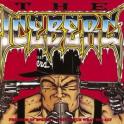Ice-T didn’t beef – he dialogued
Back around the year 1993, in my tiny hometown on Sweden’s second coast, my ears suddenly burst wide open for rap music. My best friend had Naughty By Nature’s first tape, which I copied and played all day. Then I bought Doggystyle, which I’m still playing. Friends provided me with taped copies of Black Sunday and Välkommen till förorten (and I got the t-shirts, the VHS tapes, and tried to never miss an episode of YO! MTV Raps)
Those who were cooler than me listened to Ice-T – “the final level of the game“. Though the New Jersey-born, Los Angeles-bred rapper had reached his peak some years before, he still out-hypnotized newcomers Snoop, Warren G and Dogge Doggelito with pure iconic power.
After yesterday’s ponytail chock (the last one to rock the pimped out 80s swagger has given in, I am told), I knew I had to pull out some classic Iceberg material while cleaning up the apartment. His five first albums are so strong (and the following three, all the way up to Gangsta Rap are surprisingly worthwhile). My favorite is Original Gangster, but today it was time for The Iceberg / Freedom Of Speech… Just Watch What You Say.
The production on this album is an interesting synthesis of Marley Marl’s James Brown-interpretations, the riot funk of The Bomb Squad, and the ice cold electro beats that Ice-T had been rapping over on Reckless and Colors. You have to love the thick moog-basslines nestling through the dense soundwall of Lethal Weapon, the hectic drum programming on Hit The Deck.
Besides acting as a spokesperson for his generation, his social class, his city – never afraid of breaking taboos, mixing genres, and telling stories nobody wanted but everybody needed to hear, that is, executing the Gangsta Rap formula to its fullest – Ice-T was also an ambassador. He showed it by putting on east coast talent such as Lord Finesse and Everlast (and smelly old punk rockers like Jello Biafra!), always bigging up peers Big Daddy Kane, Public Enemy, BDP, Slick Rick, Too Short – but also by encouraging dialogue on wax. Freedom Of Speech has two good examples of this: You Played Yourself and This One’s For Me.
In the first he does something that’s very healthy for the music, but frowned upon these days. They call it hating, but it should be called telling the truth, and not caring about who you piss off – even your own people. Tracy Marrow introduces the listener to the dumb rapper, the failed mack, the spoiled rapper, and the drug addict. This kind of moral folklore is arguably the most important thing in rap music, but the industry has all but deleted it.
How you gonna drop science? You’re dumb
Stupid ignorant, don’t even talk to me
At school you dropped Math, Science and History
And then you get on the mic and try to act smart
Well let me tell you one thing, you got heart
To perpetrate, you’re bait, so just wait
Till the press shove a mic in your face
Or you meet Boogie Down or Chuck D
Stetsasonic or the Big Daddy
And they ask you about the game you claim you got
Drop science now, why not?
You start to sweat and fret, it gets hot
How’d you get into this spot?
You played yourself…
Yo, yo, you played yourself…
(…)
Spendin’ money’s what I’m talkin’ about
But you fool out, your pockets got blew out
And after the date, no boots, you got threw out
Mad and shook cos your duckets got took
Call her up, phone’s off the hook
But who told you to front and flaunt your grip?
You can’t buy no relationship
You played yourself…
Yo, homeboy, you played yourself…
(…)
Page 1 of 2 | Next page
